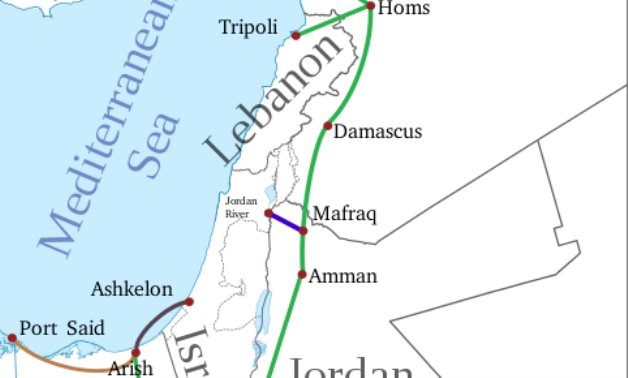
Arab Gas Pipeline- CC via Wikimedia
CAIRO - 21 October 2021: The United States assured that all international partners in the project of supplying Lebanon with Egyptian gas will not be subjected to the Caesar Act ( the Caesar Syria Civilian Protection Act of 2019), said Lebanese Minister of Energy Walid Fayyad on Wednesday.
The US assurances were delivered during a meeting between Fayyad and US mediator in Lebanese-Israeli indirect talks on maritime demarcation Amos Hochstein.
Egypt will export natural gas to Lebanon in the coming weeks through the Arab Gas Pipeline, Minister of Petroleum Tarek el-Mulla said in a press conference on October 5, 2021.
Talks were held for two days with Fayyad to lay down a road map for supplying Lebanon with Egyptian gas, including all technical, commercial, and contractual aspects, as well as the supply mechanism.
A timeframe was set to coordinate with Jordan and Syria to so the Egyptian gas passes through their territories on the way to Lebanon, Mulla said.
He added that President Abdel Fattah el-Sisi personally supports the export to help alleviate Lebanon’s energy crisis.
The Lebanese minister said the Egyptian gas will help stabilize the energy sector of Lebanon and help preserve the environment.
He conveyed the Lebanese government’s gratitude for Egypt’s keenness on supporting Beirut in all fields, especially energy.
Lebanon has been having a pressing energy crisis for the past few years with long lines of vehicles waiting to be fueled and rolling power cuts.
The Arab Gas Pipeline was implemented in three phases; the first phase started from Egypt’s Al-Arish city in Sinai to Jordan’s Aqaba, with a length of 265 km, a diameter of 36 inches, and a capacity of 10 billion m3 per year, the Jordanian ministry said in the statement. The supply of the gas through this pipeline started on July 27, 2003.
The second phase of the joint pipeline was implemented on two stages; the first stage extended from Aqaba to the Rehab, Northern Jordan, with a length of 393 km. The supply of gas to power plants in Rehab began in February 2006. Meanwhile, the second stage of the second phase stretched from Rehab to the Jordanian-Syrian border with a length of 30 km and 36 inches in diameter. The second stage was competed in March 2008.
As for the third phase, it starts from the Jordanian-Syrian border to the city of Homs in Syria. This 320-kilometer pipeline was completed in July 2008. The pipeline is 36 inches in diameter. The Egyptian natural gas was exported to Lebanon through the Jordanian territories in 2009, but it stopped in 2011 after the January 25, 2011 uprising.
Comments
Leave a Comment